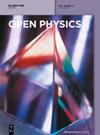Numerical analysis of dengue transmission model using Caputo–Fabrizio fractional derivative
IF 1.8
4区 物理与天体物理
Q2 PHYSICS, MULTIDISCIPLINARY
引用次数: 0
Abstract
This study demonstrates the use of fractional calculus in the field of epidemiology, specifically in relation to dengue illness. Using noninteger order integrals and derivatives, a novel model is created to examine the impact of temperature on the transmission of the vector–host disease, dengue. A comprehensive strategy is proposed and illustrated, drawing inspiration from the first dengue epidemic recorded in 2009 in Cape Verde. The model utilizes a fractional-order derivative, which has recently acquired popularity for its adaptability in addressing a wide variety of applicable problems and exponential kernel. A fixed point method of Krasnoselskii and Banach is used to determine the main findings. The semi-analytical results are then investigated using iterative techniques such as Laplace-Adomian decomposition method. Computational models are utilized to support analytical experiments and enhance the credibility of the results. These models are useful for simulating and validating the effect of temperature on the complex dynamics of the vector–host interaction during dengue outbreaks. It is essential to note that the research draws on dengue outbreak studies conducted in various geographic regions, thereby providing a broader perspective and validating the findings generally. This study not only demonstrates a novel application of fractional calculus in epidemiology but also casts light on the complex relationship between temperature and the dynamics of dengue transmission. The obtained results serve as a foundation for enhancing our understanding of the complex interaction between environmental factors and infectious diseases, leading the way for enhanced prevention and control strategies to combat global dengue outbreaks.利用卡普托-法布里齐奥分数导数对登革热传播模型进行数值分析
本研究展示了分数微积分在流行病学领域的应用,特别是与登革热疾病相关的应用。通过使用非整数阶积分和导数,建立了一个新模型来研究温度对病媒-宿主疾病登革热传播的影响。该模型从 2009 年佛得角首次登革热疫情中汲取灵感,提出并说明了一项综合策略。该模型采用了分数阶导数,该导数因其在解决各种适用问题时的适应性和指数内核而受到欢迎。该模型采用 Krasnoselskii 和 Banach 的定点法来确定主要结论。然后使用拉普拉斯-阿多米分解法等迭代技术对半分析结果进行研究。利用计算模型来支持分析实验,提高结果的可信度。这些模型有助于模拟和验证登革热爆发期间温度对病媒-宿主复杂动态相互作用的影响。必须指出的是,这项研究借鉴了在不同地理区域进行的登革热爆发研究,从而提供了更广阔的视角,并从总体上验证了研究结果。这项研究不仅展示了分数微积分在流行病学中的新应用,还揭示了温度与登革热传播动态之间的复杂关系。研究结果为加深我们对环境因素与传染病之间复杂互动关系的理解奠定了基础,为加强登革热疫情的预防和控制策略指明了方向。
本文章由计算机程序翻译,如有差异,请以英文原文为准。
求助全文
约1分钟内获得全文
求助全文
来源期刊

Open Physics
PHYSICS, MULTIDISCIPLINARY-
CiteScore
3.20
自引率
5.30%
发文量
82
审稿时长
18 weeks
期刊介绍:
Open Physics is a peer-reviewed, open access, electronic journal devoted to the publication of fundamental research results in all fields of physics. The journal provides the readers with free, instant, and permanent access to all content worldwide; and the authors with extensive promotion of published articles, long-time preservation, language-correction services, no space constraints and immediate publication. Our standard policy requires each paper to be reviewed by at least two Referees and the peer-review process is single-blind.
 求助内容:
求助内容: 应助结果提醒方式:
应助结果提醒方式:


